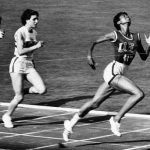On this day 140 years ago, Helen Keller was born with full sight and hearing in Alabama. Before the age of two she was stricken with disease and left deaf and blind, but at 24, she became the first deaf and blind American to earn a bachelors degree (cum laude), and she became a world-famous speaker and author of twelve books—the first while she was still in college.
She traveled to 39 countries and was remembered as a suffragist and leftist activist, but mostly, being a powerful advocate for disabled people and transforming the view others had of the disabled. Her life—and her education with radical teacher, Anne Sullivan—was immortalized on Broadway and film. The play and film version of, The Miracle Worker, were based on Keller’s autobiography, The Story of My Life. WATCH a short video… (1880)
– Click to enlarge this Library of Congress image by an unknown photographer
MORE Good News on this Day:
- President John F. Kennedy visited his ancestral homeland from where his great grandfather set sail for America during the Irish potato famine of 1848, and reporters covered the joyful return (1963)
- President Richard Nixon, having made great progress over the previous two years in U.S.-Soviet relations, visited the U.S.S.R for the second time, arriving to a welcome ceremony, cheering crowds, and a state dinner with Brezhnev at the Grand Kremlin Palace — and for discussions of a proposed mutual defense pact, détente, and nuclear weapons (1973)
- Queen played their first gig featuring Freddie Mercury (possibly still known as Freddie Bulsara) on vocals, guitarist Brian May, drummer Roger Taylor and Mike Grose on bass at Truro City Hall, Cornwall, England (1970)
- The Indigenous and Tribal Peoples Convention adopted the ILO-169, a major binding international convention to respect the rights of indigenous peoples. It was ratified by 22 countries (1989)
- U.S. President Bill Clinton and China’s Communist President Jiang Zemin appeared in a live joint news conference that was seen throughout China, with questions and answers that gave viewers an uncensored look at the differences between the two nations, with discussions about trade, human rights, Chinese freedoms, and their views on the 1989 Tiananmen Square massacre and the Dalai Lama [See the full one-hour video on YouTube] (1998)
- The first federal Do-Not-Call list went into effect with the US registering more than 735,000 phones for a list that blocks some of the unwelcome solicitations of tele-marketers–except for charities and political groups (2003)
Also, on this day in 1987, Whitney Houston became the first woman in US history to enter the album chart at #1 with ‘Whitney’. She is the only artist ever to chart seven consecutive #1 songs on Billboard’s top 100 chart, and also became the first woman to top the singles chart with four consecutive releases, when ‘I Wanna Dance With Somebody’ hit No.1.
Houston was also an actor, and her first role was starring in The Bodyguard (1992). The film’s original soundtrack won the 1994 Grammy Award for Album of the Year. Its lead single, “I Will Always Love You“, won the Grammy Award for Record of the Year and became the best-selling single by a woman in music history. In 2009, Guinness World Records cited the New Jersey native who died at age 48 of drug use as the most awarded female act of all-time.
And, on this day in 2006, the British Foreign and Commonwealth Office Minister wrote an essay to remind everyone that Muslims have been an integral part of Britain and its way of life for centuries—and Islam is not something that’s arrived in the last few years.
Lord Triesman‘s essay, originally printed in the Jordan Times and reprinted with permission here at Good News Network, reminded Westerners that the rich scientific tradition in Muslim countries, with advances in medicine and mathematics—and countless other civilizing influences—“triggered the Renaissance and allowed Europe to slowly emerge from the Dark Ages.” (Photo by munozgo, CC)
SHARE the Milestones…




